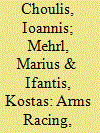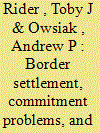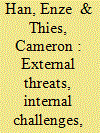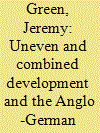|
|
|
Sort Order |
|
|
|
Items / Page
|
|
|
|
|
|
|
| Srl | Item |
| 1 |
ID:
187352


|
|
|
|
|
| Summary/Abstract |
Arms races are linked in the public conscience to potential violence. Following gas discoveries in eastern Mediterranean, Greece and Turkey nearly came to blows in August 2020 and both states have enacted military expansion plans, further risking escalation. We present a novel approach to study the effect of military build-ups on dispute intensity, using monthly data on Turkish incursions into Greek-claimed airspace. Because airspace claims feature strongly in the dispute, these contestations represent an appropriate measure of the intensity with which Turkey pursues the conflict. Theoretically, we suggest that bilateral factors drive this intensity. We argue that increased Greek military capabilities deter incursions whereas increased Turkish military capabilities fuel them. Results from time-series models support the second expectation. Consequently, the study provides a novel methodological approach to studying interstate conflict intensity and shines new light on escalation dynamics in the Greek-Turkish dispute.
|
|
|
|
|
|
|
|
|
|
|
|
|
|
|
|
| 2 |
ID:
140082


|
|
|
|
|
| Summary/Abstract |
Many studies have examined the formation of interstate rivalries, but few provide a theoretical mechanism capable of explaining why some neighboring states experience protracted conflict while others do not. To address this question, we theoretically link bargaining theories of conflict with issue-based explanations of conflict to offer a novel application of the commitment problem mechanism. We argue that when neighboring states disagree over border territory endowed with a potential source of power (i.e. strategic or economic value), it is difficult for either side to commit credibly in the future to comply with agreements made today. Consequently, neighboring states may be reluctant to make concessions that could enhance their adversary’s future bargaining power. This reluctance, in turn, increases the likelihood of bargaining failure, thereby also increasing the likelihood that the dispute festers and the relationship evolves into a rivalry. Using recently reported data on border settlement and three measures of rivalry, we find systematic evidence for our theoretical expectations. Unsettled borders increase the likelihood of rivalry onset. This relationship, however, seems driven by border territory containing strategic and economic endowments – the exact type of territory that theoretically drives commitment problems. We therefore conclude that not all territory matters for the onset of contiguous rivalries.
|
|
|
|
|
|
|
|
|
|
|
|
|
|
|
|
| 3 |
ID:
170376


|
|
|
|
|
| Summary/Abstract |
This paper empirically tests bellicist theories of state building in the East Asian context, paying attention to the interplay between external threats and internal challenges and their implications for these states’ extractive power. How much variation in state building in the region can be attributed to war and war preparation as a result of both external threats and internal challenges? In particular, it provides more fine-grained analysis on the different types of internal challenges and their impact on state capacity building. The article argues that in the East Asia region, both external threats and internal challenges are crucial to explaining the variation in state capacity across the region. However, we also find that different types of internal challenges have different effects. Particularly, communist insurgencies seem to have both an immediate and long-term positive effect in compelling the state to respond with more extraction to engage in state-building efforts.
|
|
|
|
|
|
|
|
|
|
|
|
|
|
|
|
| 4 |
ID:
171797


|
|
|
|
|
| Summary/Abstract |
This article argues that dynamics among rivals can affect how host states respond to refugees. Particularly, refugees from rival states can motivate host countries to promote inclusive action because they are exiled from an adversary. By treating refugees well and openly respecting their human rights, host states can, in effect, shame their rival, thereby undermining the adversary's legitimacy and discrediting the opposing government in the eyes of the international community. In the absence of a strategic rivalry, host governments do not have this incentive to support refugee human rights. Using statistical analyses, I find support for these hypotheses. In particular, the arrival of refugees from a neighboring rival state are associated with the strongest increase in respect for human rights within the host country, whereas refugees from a noncontiguous, nonrival state are related to a decrease in respect for human rights.
|
|
|
|
|
|
|
|
|
|
|
|
|
|
|
|
| 5 |
ID:
169001


|
|
|
|
|
| Summary/Abstract |
The literature on civil wars has recently turned towards their international context but lacks an account for how conflict beyond a state’s borders contributes to civil war onset. I argue that interstate rivalries can increase the risk of civil war in other states when rivals come to associate the foreign-policy orientation of other states with their own security. I present three pathways through which rivals increase the risk of civil war in other states. First, competition between rivals creates a ratchet effect by which the prospect of one’s involvement in a conflict makes it more likely that the other becomes involved. This dynamic makes support easier to secure and lowers the expected costs of war for governments and opposition groups. Second, rivals encourage domestic polarization as parties attempt to capture their influence, making domestic conflicts more intractable. Third, uncertainty over the potential for intervention by rivals increases the risk of miscalculation. I test the implications of the theory with novel spatial measures of interstate conflict and rivalry. Using logistic regressions and random forests, I find that being in the neighborhood of interstate rivals can increase a state’s risk of civil war.
|
|
|
|
|
|
|
|
|
|
|
|
|
|
|
|
| 6 |
ID:
160727


|
|
|
|
|
| Summary/Abstract |
Are countries concerned about the impact on interstate commerce of security externalities? Trade often makes countries vulnerable to the vagaries of the international market and shifts the power relationship between partner countries. The volume of trade, however, has increased enormously over time. We examine how interstate rivalry affects interstate trade. An extensive literature examines the role of interstate security in shaping interstate commerce but pays little attention to that of rivalry. Similarly, the thriving rivalry literature has yet to explore the role of rivalry in non-security interstate relations such as trade. We aim to fill this gap. We argue that rivalry deters trade activities, and that this tendency is intensified amid deeper and more competitive rivalry. Using a global sample from 1949 to 2000, we find that rival dyads trade less than others, and that the negative impact of this on equal-power dyads is greater than that for unequal-power pairs.
|
|
|
|
|
|
|
|
|
|
|
|
|
|
|
|
| 7 |
ID:
113811


|
|
|
|
|
| Publication |
2012.
|
| Summary/Abstract |
This article attempts to situate the approach to World War I within the context of the uneven and combined development of 19th-century European capitalism. Through a comparative analysis of German and British development within the context of the epochal transition from feudalism to capitalism, the article proposes that existing historical materialist and Realist understandings of the roots of World War 1 are inadequate. Realist analyses, stressing the primacy of 'geopolitics', fail to provide a convincing explanation of the precise origins of German bellicosity. Instead they assume that expansionist German behaviour was an inevitable consequence of systemic anarchy. Historical materialist accounts, preferring a sociological explanation, overstate the importance of systemic capitalist crisis and the European-wide escalation of class struggle for understanding the genesis of the war. Utilizing Trotsky's concept of uneven and combined development, I contend, enables a more comprehensive understanding of the origins of the conflict.
|
|
|
|
|
|
|
|
|
|
|
|
|
|
|
|
| 8 |
ID:
178929


|
|
|
|
|
| Summary/Abstract |
With an increased focus on the role of pro-government militias in understanding intra-state conflict, scholars have primarily argued that states use militias as a proxy of the government because of low capacity or as a means of avoiding responsibility for violence against civilians. However, states with both high capacity and a willingness to commit violence against civilians have also relied upon pro-government militias in counterinsurgency operations. This paper argues that states involved in enduring interstate rivalries are more likely to use pro-government militias in order to reserve conventional military forces for potential conflict with their rival. Based on a case study of India’s Kashmir insurgency and logit analysis of pro-government militia data from 1981 to 2001, the findings provide empirical support for this theory and are robust to alternative measures and model specifications.
|
|
|
|
|
|
|
|
|
|
|
|
|
|
|
|
|
|
|
|
|